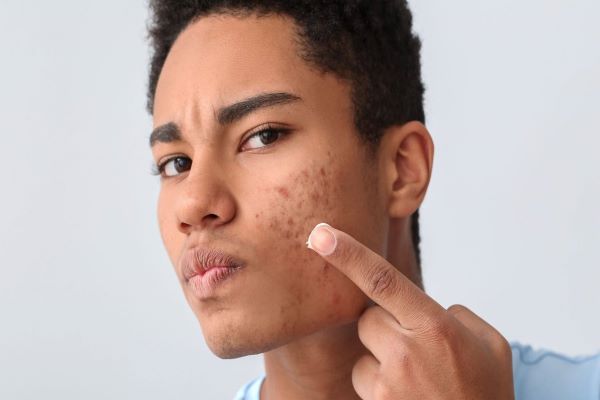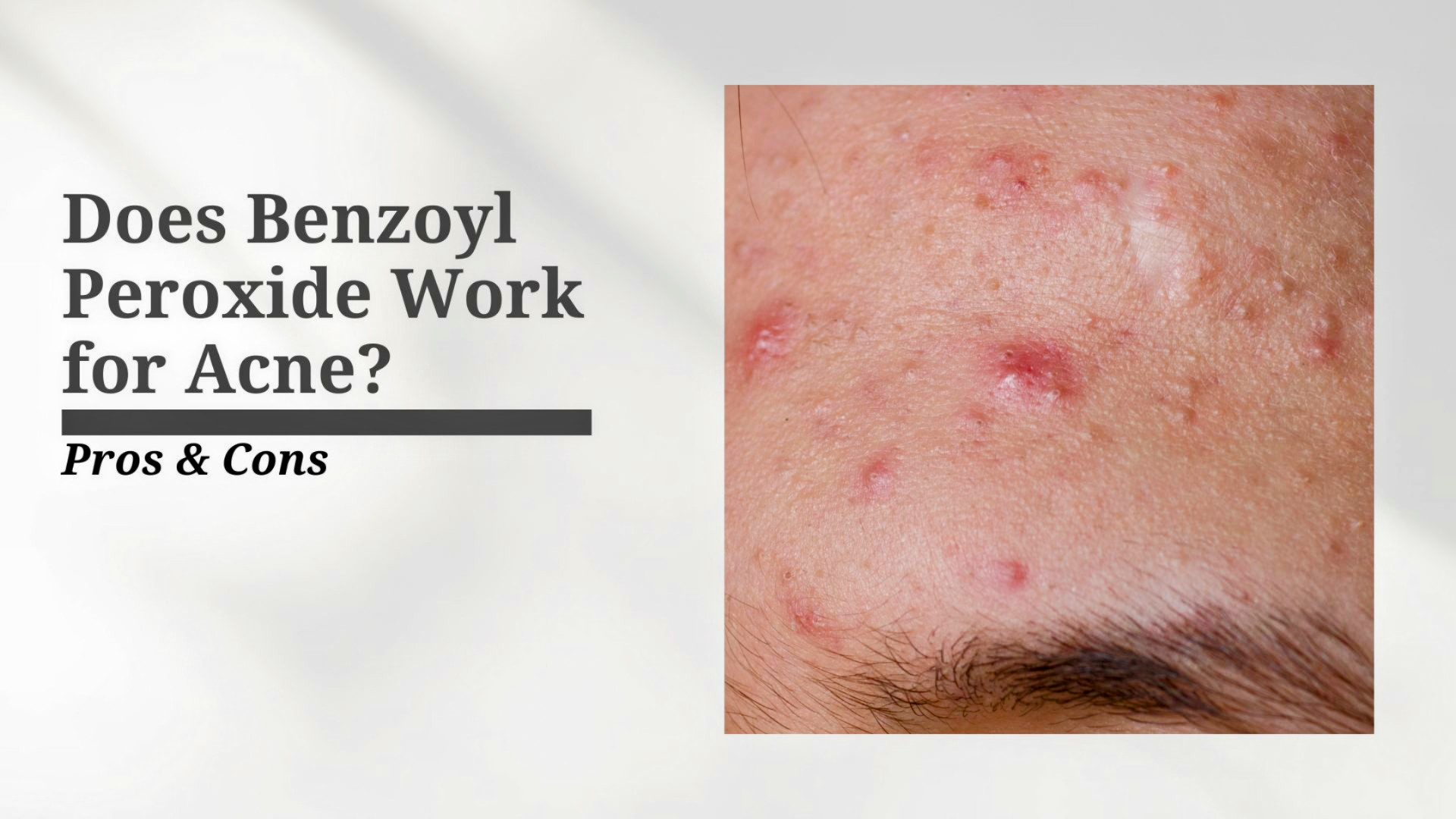Acne can be a real drag. You wake up world-weary and look in the mirror, to see yet another breakout staring right back at you…AGAIN. It often leaves us feeling hopeless, with no means of finding relief from our troublesome skin condition. But what if there was an option that could help? Enter benzoyl peroxide (aka BPO), the acne fighter many of us have heard about but are still unsure of its true power when it comes to taking on blemishes and breakouts. Does Benzoyl peroxide work for acne, really?
In this blog post, we’ll cover what you should know about using benzoyl peroxide for acne: how long it takes for results, how you should use it effectively and correctly — plus all the pros and cons. So, let’s get started on tackling your pesky zits once and for all!
Overview of Acne and How Does Benzoyl Peroxide Work

Before getting into how benzoyl peroxide works or if it actually works, here is a quick overview of acne and its causes.
– Overview of Acne, definition, and types (hormonal, cystic, nodular)
Acne is one of the most common skin conditions in the world. It occurs when your pores become clogged with oil, dead skin cells, and bacteria. Acne can cause pimples, blackheads, whiteheads, cysts, nodules, and other types of inflammation.
Hormonal acne is triggered by fluctuations in the levels of testosterone, progesterone, and estrogen. It often appears as cysts on the face, jawline, neck, chest, back, or shoulders.
Cystic acne is deep pus-filled bumps or pimples (cysts) formed under the skin. The cysts are painful to the touch. They can last for weeks, months, or even years without treatment.
Nodular acne is large, hard bumps that form deep in the skin. They can be painful and cause scarring if not treated early.
– Causes of acne
Acne is caused by many different factors, including hormones, genetics, poor diet, lack of sleep, stress, and certain medications.
Hormonal imbalances can trigger an increase in the production of oil in the skin, which can lead to clogged pores.
Genetics can also play a role in who develops acne and how severe it is.
Poor diet and lack of sleep can also contribute to acne, as they weaken the body’s natural defenses against bacteria that cause breakouts.
Stress has been linked to increased cortisol levels, which can lead to hormonal imbalances and make it more difficult for the body to fight off bacteria.
Certain medications, such as certain birth control pills (i.e. containing only progesterone) or steroids, can also increase the risk of acne.
As an amazon associate, I earn from qualifying purchases. Full disclosure…
How Does Benzoyl Peroxide Work for Acne And How Long Before the Result
Now, how does benzoyl peroxide work for acne and how long does it take to see results?
– How does benzoyl peroxide work for acne
It works by killing the bacteria that cause pimples, reducing inflammation, and encouraging skin cell turnover, and can help to unblock pores by keeping them clear of debris and dead skin cells.
Benzoyl peroxide (BPO) is available online or in many drugstores as an over-the-counter product (OTC), and in various concentrations and comes in many forms, such as creams, gels, lotions, washes, and spot treatments.
– How long before results are seen
It can take up to four weeks before you see you start to see any improvements in your skin when using benzoyl peroxide. However, it can take up to 3 to 4 months to see full results. Some people may experience redness, stinging, dryness, flaking, and peeling in the first few days to weeks of use. Side effects can last up to 6 weeks from the first day of use, but subsides during this period as the skin adjusts to the product.
Pros of Using Benzoyl Peroxide for Acne Treatment: The Benefits
Benzoyl peroxide is a popular treatment for acne because it can be very effective in clearing up blemishes and keeping skin clear. It has several benefits, including:
- It can be used to treat inflammatory acne, blackheads, whiteheads, and cystic or hormonal acne.
- Kills acne-causing bacteria.
- Reduces Inflammation such as redness and swelling caused by acne.
- Encourages Skin Cell Turnover by helping to shed dead skin cells, allowing healthy new cells to form.
- Unblocks Pores and prevents future breakouts by keeping them clear of debris and dead cells.
Cons of Using Benzoyl Peroxide for Acne Treatment: The Limitations
There are also some drawbacks to using benzoyl peroxide for acne treatment, including:
- Irritation and Dryness: Although it is safe for use and not everyone gets them, benzoyl peroxide can cause skin irritation and dryness.
- Does Not Treat Nodular Acne: Benzoyl peroxide is not effective in treating nodular acne, which requires specialist treatments by a dermatologist.
- Does Not Treat Underlying Causes: Benzoyl peroxide does not address underlying causes of acne such as hormones, poor diet, and lack of sleep.
Benzoyl Peroxide Side Effects
Benzoyl peroxide is generally safe for use, but it can cause skin irritation and dryness. Some common side effects include redness, stinging, burning, itching, peeling, and flaking of the skin.
Allergic reaction is also possible, so it is important to stop using benzoyl peroxide if you experience any of the following symptoms: rash, hives, itching, as well as facial, lips, or tongue swelling, wheezing, or difficulty breathing.
How to Treat Benzoyl Peroxide Side Effects
Dry skin & flaking
Take short showers and use warm water instead of hot.
Apply oil-free moisturizer before using benzoyl acid medication. This can help to reduce dryness and flaking.
If using a benzoyl peroxide cleanser, apply oil-free moisturizer immediately after use while your skin is still damp.
Avoid products that contain drying ingredients like alcohol or menthol, as these can further dry out the skin.
If using over-the-counter (OTC) forms like gel, cream, lotion, look for brands that contain moisturizing ingredients such as glycerin or hyaluronic acid.
Using a sunscreen with at least SPF 30 can help to stop the sun from
Redness and peeling
Use a gentler cleanser when washing your face, as well as a lightweight moisturizer with SPF protection after using the product.
Avoid using scrubs or products with harsh ingredients like alcohol.
You may also want to consider reducing usage frequency or switch to lower concentrations of benzoyl peroxide if you are experiencing redness or irritation.
Speak to a doctor if redness and peeling persist or are getting worse.
Irritation – stinging, burning, itching
Avoid any harsh exfoliants or scrubs, which can further irritate the skin. Look for a gentle cleanser, and avoid products with harsh ingredients such as alcohol and menthol.
Look for products that contain soothing ingredients, such as aloe vera, chamomile or oat extract, which can help reduce irritation.
For irritation (stinging, burning, and itching), it may help to reduce the frequency of use by changing from twice daily usage to once daily usage according to the manufacturer’s recommendation. Using a product with lower concentration can also be helpful.
If using prescription strength benzoyl peroxide, speak to your doctor about switching to a lower concentration or reducing the frequency of use.
Don’t hesitate to speak to your doctor if irritation persists or worsens.
Sunscreen
It is also recommended to use a sunscreen when using benzoyl peroxide, as exposure to the sun can cause further irritation and dryness.
Choose a sunscreen with at least SPF 30, and look for products that are oil-free and noncomedogenic to reduce the risk of clogging pores.
When Should You Seek Professional Help for Your Acne Treatment
Lastly, if any of the side effects persist or become worse over time, it is best to seek advice from a dermatologist.
OTC benzoyl peroxide might not be strong enough to treat severe acne, and it could take several treatments or a combination of medications from a dermatologist to successfully clear your skin.
If you are using OTC products for a few weeks, sticking to the regimen and still not seeing results, it may be time to consult a dermatologist for more specialized treatments.
A doctor can prescribe stronger medications that target the underlying causes of acne and treat even more persistent or severe forms of acne like nodular or cystic
In any situation, it is important to do research on the best treatment for your individual needs and to seek the advice of a qualified professional if needed.
Tips on How to Use Benzoyl Peroxide Effectively
It is important to use benzoyl peroxide correctly and effectively if you want to get the best results. Here are some tips on how to use this acne medication and get the most out of it.
Start slowly: Start with a low concentration of benzoyl peroxide, as higher concentrations may cause more irritation. Over-the-counter concentrations of benzoyl peroxide can go up to 10%.
Begin by testing the product on a small area of skin and gradually increase areas until you find the right concentration for your skin type.
Apply properly: Benzoyl peroxide should be applied to the whole area, and not just the affected spots unless you are using spot treatments. Start off with once daily usage and work up from there as recommended by the manufacturer.
Consistency: Consistent use of the product is key to getting good results. It can take several weeks before you start to see any improvement, so make sure to stick with the regimen for best results.
Avoid direct sun exposure: Sunlight and UV rays may cause further irritation and dryness when using benzoyl peroxide, so apply sunscreen each time you use the medication.
Take it easy with other products: Other acne medications or skin care products may irritate your skin if used together with benzoyl peroxide so be sure to consult your doctor if you want to combine products.
If side effects are too much: If irritation, redness, or stinging persists, it may be best to seek the advice of a dermatologist. A doctor can prescribe products with lower concentrations or other medications that can help reduce irritation.
By following these tips and being consistent with benzoyl peroxide usage, you should start to see improvements in your skin within several weeks.
Wrapping Up – Does Benzoyl Peroxide Work for Acne or Not??
Benzoyl peroxide is a popular acne treatment and it is widely used in topical creams, gels and facial washes.
Does benzoyl peroxide work for acne? The answer is yes – benzoyl peroxide has proven to be effective for mild to moderate cases of acne, as well as for some more severe cases. However, you may require a combination of treatments or stronger medications from a dermatologist to achieve the desired results for severe, persistent acne.
It can help reduce the occurrence of breakouts, kill bacteria under the skin and aid pores to shed dead cells and extra sebum.
It is important to use benzoyl peroxide correctly and be consistent with usage if you want to get good results. If irritation persists or OTC products do not work over time, it is important to consult a dermatologist for more specialized treatments.
Overall, benzoyl peroxide can be an effective acne treatment but it is important to remember that individual results may vary and professional medical advice should be sought if necessary.
With the right combination of products and care, you should start to see improvements in your skin within several weeks. Good luck!
Leave a comment below if you have any questions about Does Benzoyl Peroxide Work for Acne or if you have any other tips to share! We would love to hear from you. Thanks for reading!
